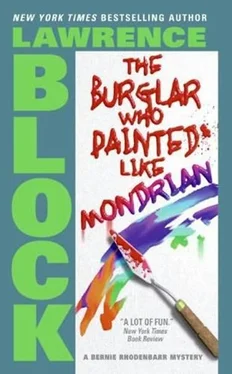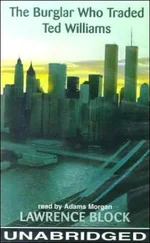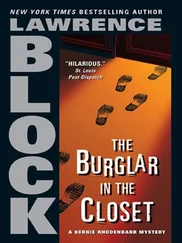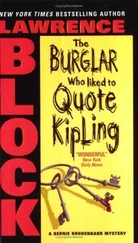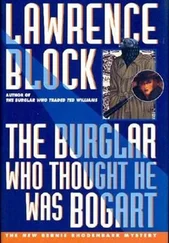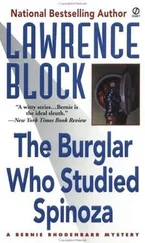“You never told me your name.”
“Oh, my name,” she said, and hesitated for only a second. “It’s Elspeth. Elspeth Peters.”
“Lovely name.”
“Thank you. I-”
“I suppose you think I stole the painting from your grandfather’s house lo these many years ago. I can understand that, Ms. Peters. You bought a book in my shop and my name stuck in your mind. Then you read something or heard something to the effect that I had a minor criminal career years ago before I became an antiquarian bookman. You made a mental connection, which I suppose is understandable, and-”
“I don’t think you stole the painting from my grandfather.”
“You don’t?”
“Why, did you?”
“No, but-”
“Because I suppose it’s possible, although you would have been a fairly young burglar yourself at the time, wouldn’t you? Personally I’ve always thought that my father was right and Uncle Billy took it, but for all I know Uncle Billy was right and my father took it. Whoever took it sold it, and do you know who bought it?”
“I could take a wild guess.”
“I’m sure you could.”
“J. McLendon Barlow.”
That was news to her. She stared at me. I repeated the name and it still didn’t seem to mean anything to her. “That was the man who loaned it to the Vermillion Galleries,” I said, “and later on he donated it to the Hewlett Collection. Remember?”
“I don’t know what you’re talking about,” she said. “The painting- my painting-was on loan from the collection of a Mr. Gordon Kyle Onderdonk.”
“Oh,” I said.
“And I read newspapers, Mr. Rhodenbarr. That minor criminal career of yours doesn’t seem to have ceased with your entry into the book business. If the papers are to be believed, you were arrested for Mr. Onderdonk’s murder.”
“I suppose that’s technically true.”
“And now you’re out on bail?”
“More or less.”
“And you stole the painting from his apartment. My painting, my Mondrian.”
“Everyone seems to think that,” I said, “but it’s not true. The painting’s gone, I’ll admit that, but I never laid a glove on it. There’s some sort of traveling exhibit coming up and Onderdonk was going to lend them his painting. He sent it out for reframing.”
“He wouldn’t do that.”
“He wouldn’t?”
“The sponsors of the show would attend to that, if they felt the work needed reframing. I’m positive you took the painting.”
“It was gone when I got there.”
“That’s very difficult to believe.”
“I had trouble believing it myself, Ms. Peters. I still have trouble, but I was there and saw for myself. Or didn’t see for myself, since there was nothing to see except an empty space where a picture had been.”
“And Onderdonk told you he’d sent the picture out for framing?”
“I didn’t ask him. He was dead.”
“You killed him before you noticed the painting was gone?”
“I didn’t get a chance to kill him because somebody beat me to it. And I didn’t know he was dead because I didn’t look in the closet for his body, because I didn’t know there was a body to look for.”
“Someone else killed him.”
“Well, I don’t think it was suicide. If it was, it’s the worst case of suicide I ever heard of.”
She looked off into the middle distance and a couple of frown lines clouded her brow. “Whoever killed him,” she said, “took the painting.”
“Could be.”
“Who killed him?”
“I don’t know.”
“The police think you did it.”
“They probably know better,” I said. “At least the arresting officer does. He’s known me for years, he knows I don’t kill people. But they can prove I was in the apartment, so I’ll do for a suspect until they come up with a better one.”
“And how will that come about?”
I’d already thought of this. “Well, if I can figure out who did it, I suppose I could pass the word.”
“So you’re trying to learn the identity of the killer.”
“I’m just trying to get through the days one at a time,” I said, “but I’ll admit I’m keeping my eyes and ears open.”
“When you find the killer, you’ll find the painting.”
“It’s not when, it’s if. And even so, I may or may not find the painting at the same time.”
“When you do, I want it.”
“Well-”
“It’s rightfully mine. You must realize that. And I mean to have it.”
“You just expect me to hand it over to you?”
“That would be the smartest thing you could do.”
I stared at this delicate creature. “Good grief,” I said. “Was that a threat?”
She didn’t draw her eyes away, and what big eyes they were. “I would have killed Onderdonk,” she said, “to get that painting.”
“You’re really obsessed.”
“I’m aware of that.”
“Listen, this may strike you as a wild idea, but have you ever thought about therapy? Obsessions just keep the focus off our real problems, you know, and if you could have the obsession lifted-”
“When I have my hands on my painting, the obsession will be lifted.”
“I see.”
“I could be a good friend to you, Mr. Rhodenbarr. Or I could be a dangerous enemy.”
“Suppose I did get the painting,” I said carefully.
“Does that mean you already have it?”
“No, it means what I just said. Suppose I get it. How do I get hold of you?”
She hesitated for a moment, then opened her bag and took out a fine-line felt-tip pen and an envelope. She held the envelope upside-down and tore off a piece of its flap, returned the rest of the envelope to her purse, and wrote a telephone number on the scrap. Then she hesitated for another beat and wrote E. Peters beneath the number.
“There,” she said, setting the slip on the counter beside the open art book. She capped her pen, put it back in her purse, and seemed about to say something when the door opened and the tinkling of bells announced a visitor.
The visitor in turn announced herself. It was Carolyn, and she said, “Hey, Bern, I got another phone call and I thought-” Then Elspeth Peters turned to face Carolyn, and the two women looked at each other for a moment, and then Elspeth Peters walked past her and on out the door.
“Don’t fall in love with her,” I told Carolyn. “She’s already in the grip of an obsession.”
“What are you talking about?”
“The way you stared at her. I figured you were falling in love, or perhaps in lust. Which is understandable, but-”
“I thought I recognized her.”
“Oh?”
“I thought for a minute she was Alison.”
“Oh,” I said. “Was she?”
“No, of course not. I’d have said hello if she was.”
“Are you sure?”
“Of course I’m sure. Why, Bern?”
“Because she said her name was Elspeth Peters, and I don’t believe her. And she’s tied into the Mondrian business.”
“So? Alison’s not, remember? Alison’s tied into me.”
“Right.”
“There’s a strong resemblance, but that’s all it is, a resemblance. How’s she tied in?”
“She thinks she’s the painting’s rightful owner.”
“Maybe she stole the cat.”
“Not that painting. Onderdonk’s painting.”
“Oh,” she said. “There’s too many paintings, you know that?”
“There’s too much of everything. You just had a phone call, you started to say. From the Nazi?”
“Right.”
“Well, it couldn’t have been Peters. She was here with me.”
“Right.”
“What did she want?”
“Well, she sort of put my mind at rest,” Carolyn said. “She said the cat was alive and well and nothing bad would happen to him as long as I cooperated. She said I didn’t have to worry about them cutting off an ear or a foot or anything, that the bit with the whiskers was to show they meant business but they wouldn’t hurt him or anything. And she said she knew the painting was going to be difficult to get but she was sure we could do it if we put our minds to it.”
Читать дальше
